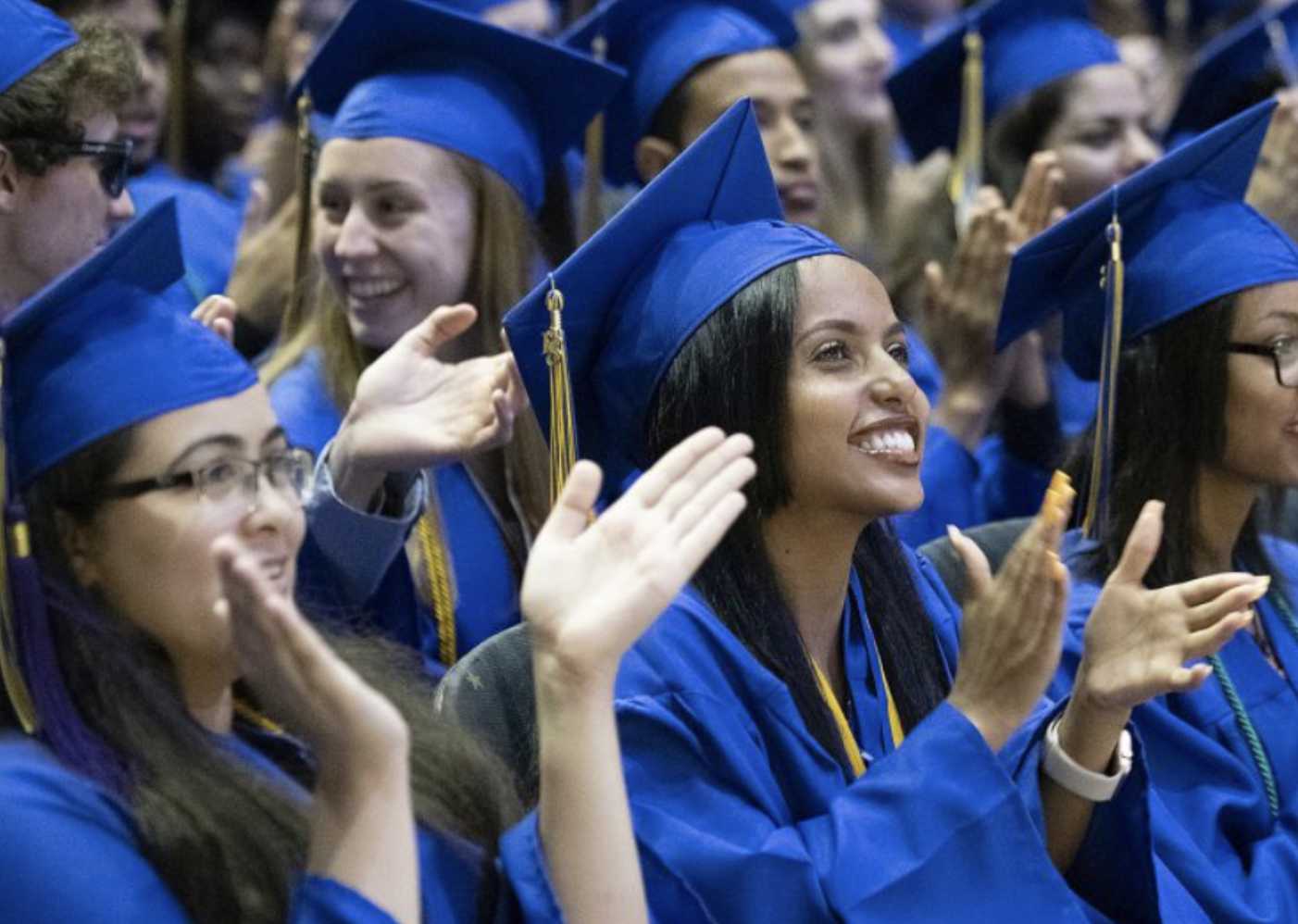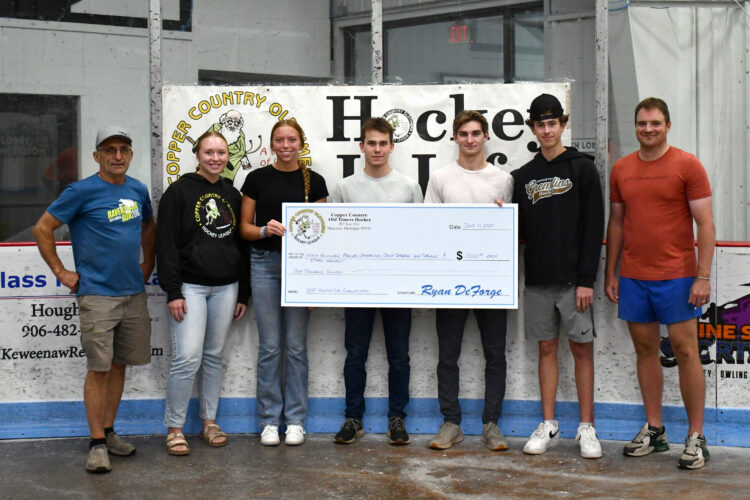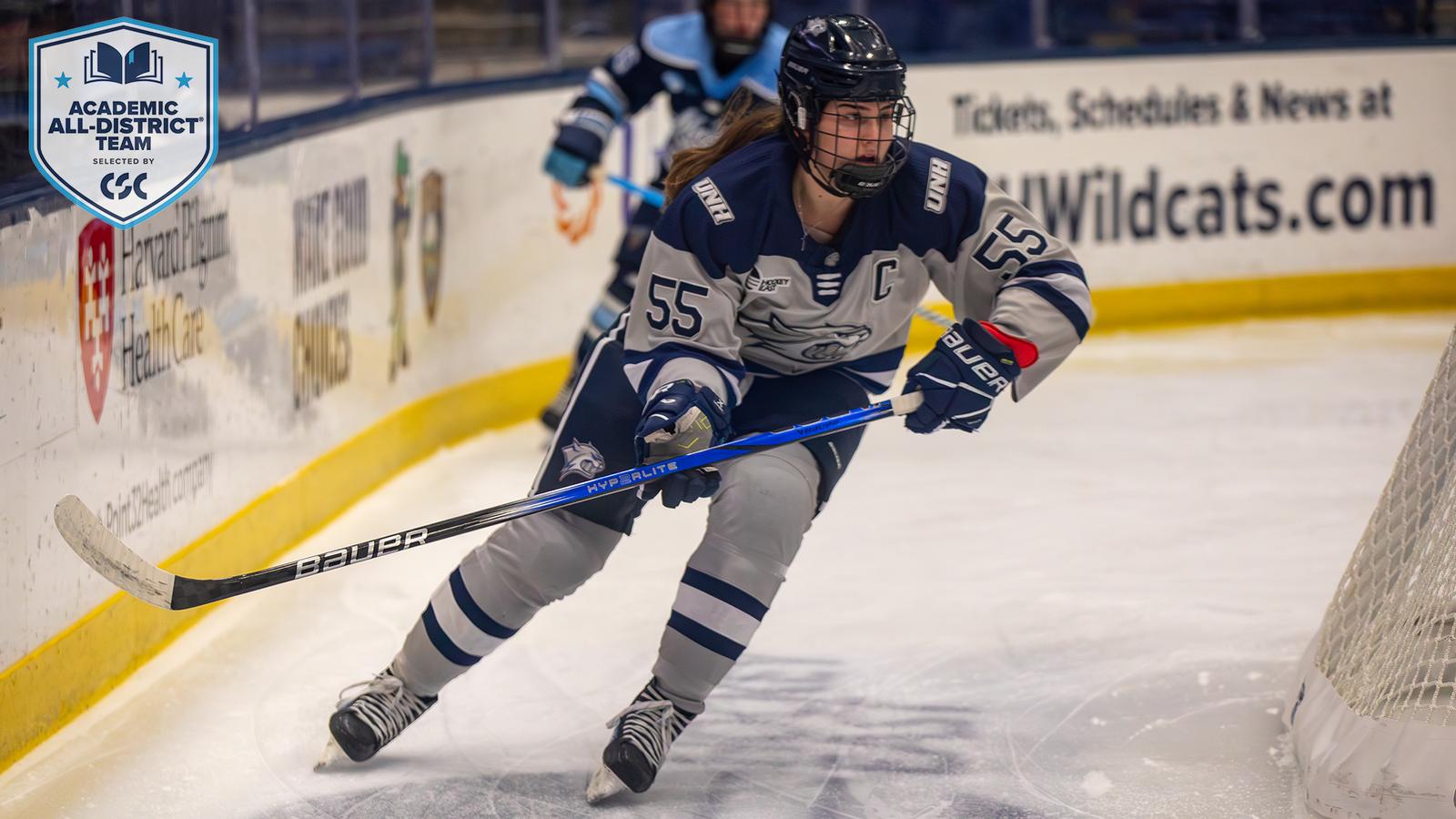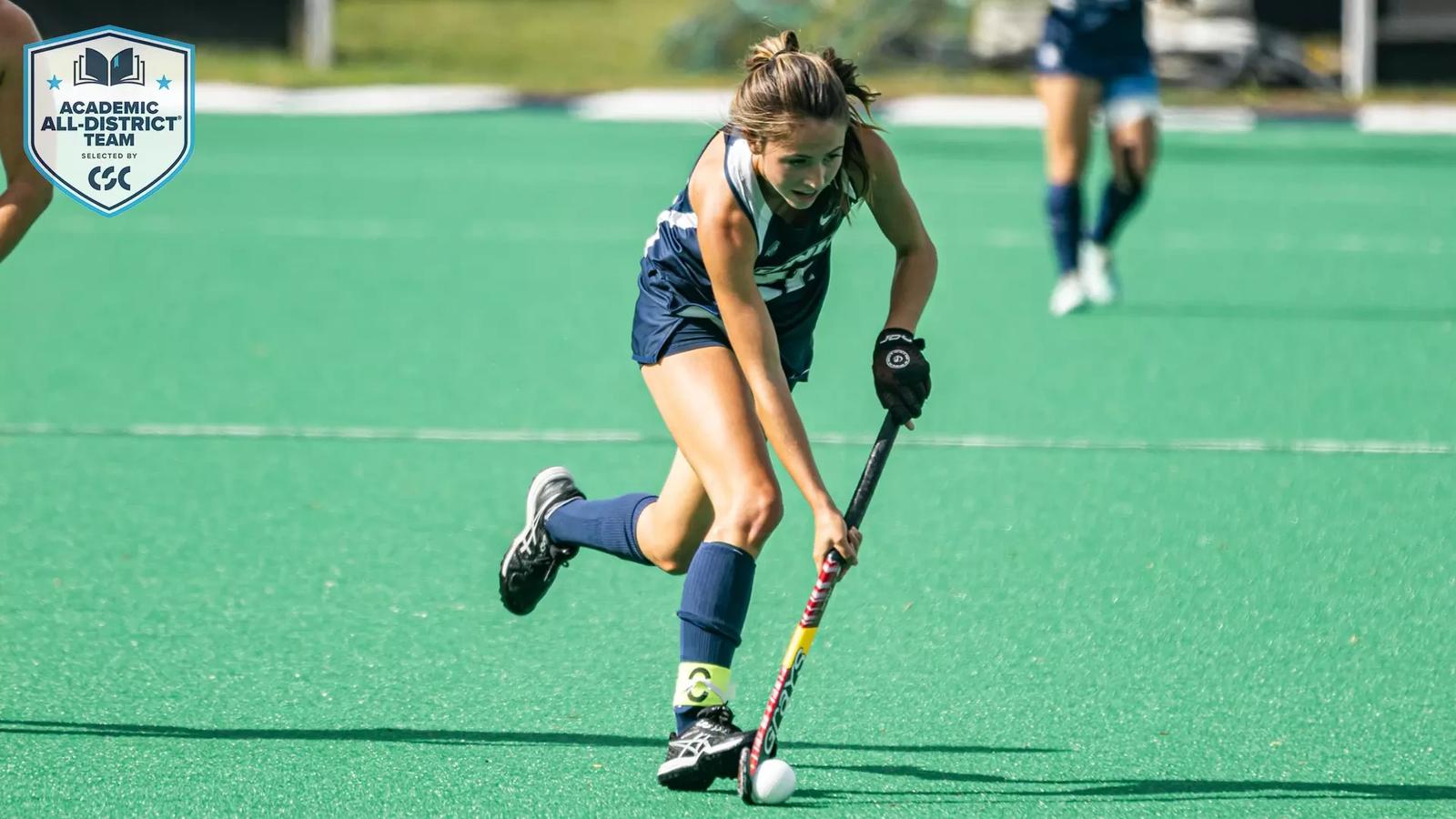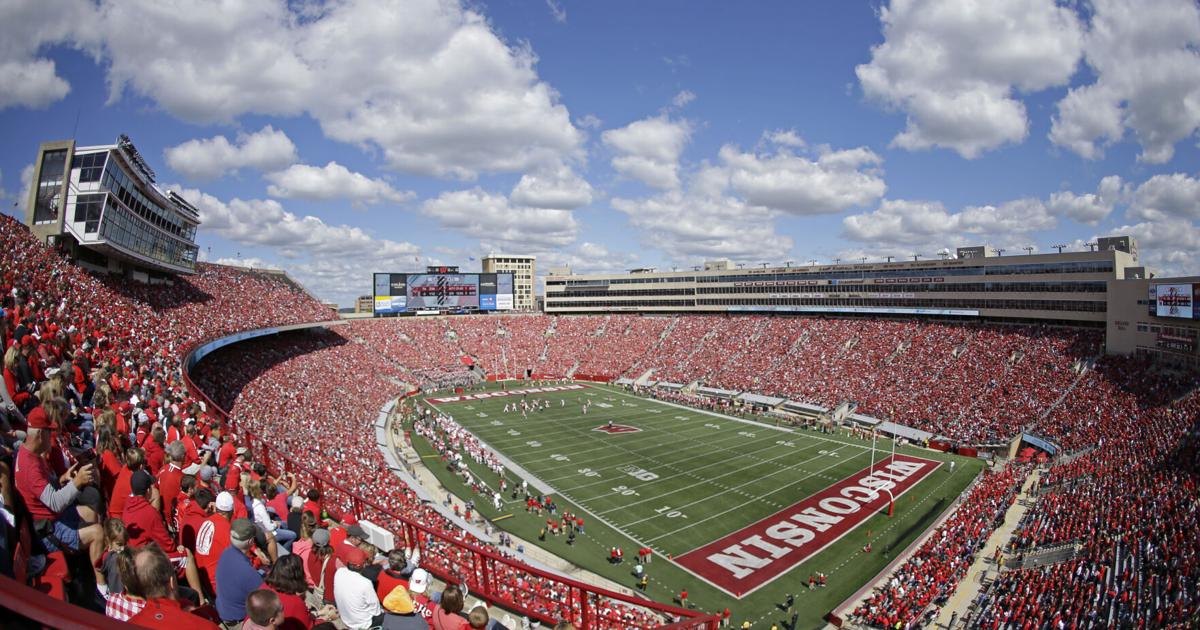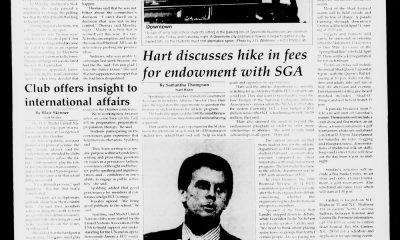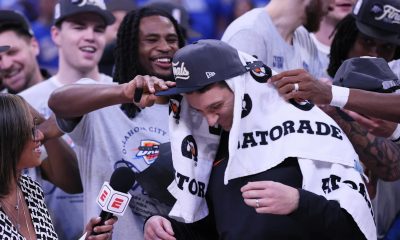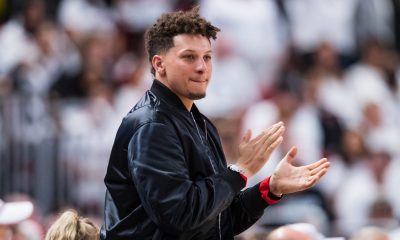Five local graduates have been awarded the Hockey is Life scholarship from the Copper Country Oldtimers Hockey League Tuesday at the HoCo Arena in Hancock. Pictured are league board members Joe Marino (left) and Matt Marchel (right), along with the recipients (from left) Mallory Sporalski, Chloe Serafin, Max Heinonen, Jace DeForge, and Ethan Hainault.
HANCOCK — The Copper Country Oldtimers doled out five scholarships this year to area high school graduates looking to take the next step in their lives by going to college. Hancock’s Max Heinonen and Mallory Sporalski, along with Houghton’s Chloe Serafin, Jace DeForge, and Ethan Hainault were all presented with their checks on Tuesday at the HoCo Arena.
Mallory Sporalski, daughter of the Copper Country Oldtimers Hockey League board president Craig “Boney” Sporalski, is heading to Michigan Tech this fall. Heinonen is heading to Northern Michigan. Serafin will attend the University of Michigan. DeForge and Hainault are planning on attending Gogebic Community College this fall.
Since the formation of the league in 1983, there had always been a desire by the league to help out locally in some way.
“We always wanted to find ways that we could give back to the community when the tournament started generating lots of money,” said Boney Sporalski. “We wanted to definitely give back as much as we could.
Boney credits former board president Mark Alborn with starting the Hockey is Life scholarship.
“It was Mark’s idea, originally, who was the president at the time, to start the Hockey is Life scholarship program,” Boney said. “When he proposed it to the board, it was unanimously approved. He said, ‘Yeah, this is a fantastic idea.’ We originally wanted to go through the Keweenaw Community Foundation, but, you know, they wanted $10,000 up front, and we would no longer have control over it. So, they would determine who were the winners during the application process. We decided that we’ll select our own committee, and then that way we had more control over how much we gave out each year, and who got it.
“Some years we’ve given out as few as one. This year we’ve given out five.”
This year, the Oldtimers have handed out scholarships to a pair of student-athletes who do not play hockey, along with three that do. This is an important step in the evolution of the scholarship.
“The scholarship started out as just hockey, and then it was brought up at one of our board meetings,” said Boney. “They’re saying, ‘You know what? There are so many other kids that would apply for this and that we can help.’ Once again, everyone on the committee said, absolutely. Why? Why are we just keeping it to hockey? I mean, because we’re a hockey organization. It made sense at first, but now as the amount of money that we’ve taken in has grown, and then it just gives us more opportunity to expand on who we can give it to.
“That’s what this is, the actual first year that now we’re giving out to people other than hockey players. We plan to continue to do that in the future.”
Even participants in the Oldtimers Tournament in the spring have come to love and help contribute to the cause.
“It’s just been just absolutely the feedback from the community, the teams that come from out of town, so many people have asked me about this scholarship, saying, ‘Wow, you guys do this?’” said Boney. “We actually had one individual who wanted to be named anonymous. I’ll say he was from Minnesota. He gave an extra $100 out of his own pocket when he came and played in our tournament this year.
“He just said, ‘Make sure this goes towards your scholarship.’ That’s the kind of response we’ve gotten from this. This scholarship program, people see this and they say, ‘It’s not just a Sunday beer league, where there’s a bunch of guys getting together.’ The guys really are aware of (the fact that) we are a community organization. That has been a priority for us, to give back to the community.”
Boney also mentioned how proud Merv Klemmett would be to see how the Oldtimers league and tournament have both grown. Klemmett was the driving force behind the creation of the tournament.
“With the 46 (teams in the tournament) this past year, I know the late Merv Klemmett would be so proud, because this was his (project),” he said. “When they started the league back in 1983, with the six teams after that first year, he thought it would be a great idea, a way to accumulate the season was to say, ‘Let’s have this tournament.’ I want to say there was a team from Marquette, there was one from Sault Ste. Marie, and there were some local teams. To see how this thing has grown, it’s been amazing to be a part of it here for the last 30 years, too. I mean, I just can’t really even believe it sometimes, just the amount of impact it has on the community, and how we’ve been able to keep this thing afloat.”
Tournament grows over time
The league started in 1982 and that first season saw the first end-of-season tournament in the spring of 1983, with six teams. By 2006, the tournament had grown to 24 teams in five divisions (Elite 21+, 30+Gold, 30+Silver, 30+ Copper, 40+ Rust) with games played at HoCo Arena and Dee Stadium.
In 2008, the format was adjusted to add a 50+ Legends division.
Tom Pintar joined the tournament committee under the leadership of Scott Mikesch in 2009. In 2011, Pintar assumed the duties of chairman for the tournament. In 2012, the Calumet Colosseum became the third rink used for tournament games. The additional ice time relaxed the overall schedule and allowed for the addition of a 60+ Masters division. In 2016, the format expanded to include a Women’s Open division, bringing the number of teams to 36.
The COVID pandemic forced the tournament to go on hiatus in 2020, just eight days prior to the start. in 2022, the tournament returned with 34 teams. In 2024, the format expanded to include a 70+ Antiques division and a Women’s Recreational division, with the number of teams jumping to 43.
In 2025, Brent Kari joined Pintar as co-chairman of the tournament.
“Tom’s efforts were instrumental in the growth of the tournament, and the league’s ability to sponsor donations such as the Hockey is Life scholarships and many other community philanthropic endeavors,” said Alborn.
Pintar’s impact will be felt for years to come
Along the way, there were some very challenging situations that Pintar had to deal with. As he became chairman, Mel Pearson arrived at Michigan Tech as the head coach. It wasn’t long before Huskies home playoff games became part of the consideration for the tournament schedule.
Many of the tournament fans and players were also Huskies fans, and Pintar felt very strongly that the tournament should adjust as it could to accommodate everyone. It started out as something that hadn’t happened in 20 years, and became an almost annual last-minute scramble to adjust the schedule.
Alborn also discussed the decision to shut down the tournament during the pandemic.
“The meeting eight days before the 2020 tournament was unforgettable,” he said. “America was beginning to shut down, but we had not yet been mandated to cancel. Tom did not want to disappoint the many people involved and the committee was torn. but all realized that a two-day cancellation notice would be worse. Within days, the rinks closed.”
Pintar also has fought his own health issues during his tenure as chairman. Through it all, he put the tournament first, and it would not be what it is today without him.
“It takes many individuals to plan and coordinate such a large endeavor, and an effective leader is essential to its success,” Alborn said. “Tom has been that leader and should be thanked for his years of service to this important community event.”

